Think about it — a plastic supermarket bag has an average life of 12 minutes and yet takes 500 years to decompose in the soil.
And this soil is much more than just dirt. It’s practically a living “superorganism” that soaks greenhouse gasses, retains nutrients, and allows healthy plants to grow.
So how do you take care of this “superorganism”?
You can observe Earth Day every April 22. It’s a day of Earth Day network events, volunteering efforts, and lectures on sustainability.
But then again, should we dedicate only a single day our precious earth?
NO!
That’s why our motto is — making every day Earth Day.
Here are some actionable Earth Day tips to make REAL changes in your life.
1. Avoid Disposable Plastic
PROBLEM
Single-use plastic takes more than 500 years to decompose. In the meantime, straws, plastic bags, and six-pack rings continue to pollute the environment and hurt marine life.
SOLUTION
Use alternatives to disposable plastic — items made of wood, glass, ceramic, or stainless steel.
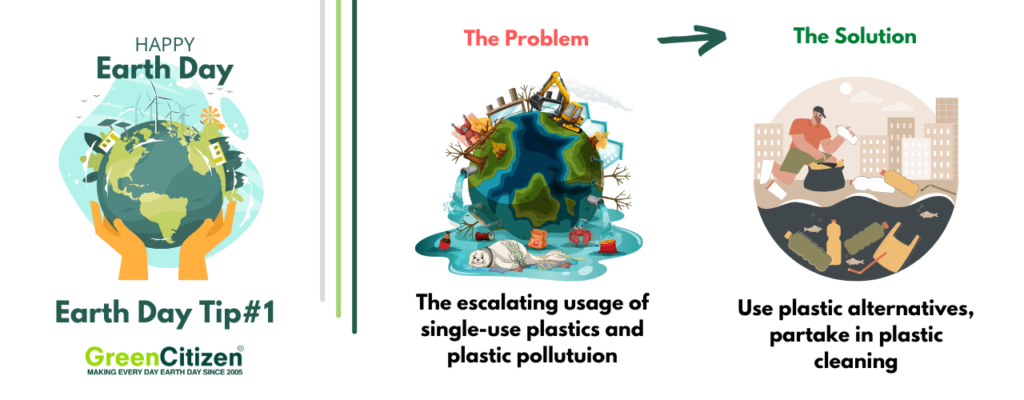
ACTION
When you go to the gym or the beach, think of Mother Earth and fill up a permanent water bottle. Bring your canvas bag when shopping for groceries. Banish the disposable cups from the office and use a nice ceramic coffee set instead.
Avoiding disposable/single-use plastics is probably the best sustainable living choice that a single individual can make.
Straws are practical, especially in cars and while traveling, not to mention refreshing summer cocktails. But straws don’t need to end up in the ocean. Switch to reusable ones made from stainless steel, silicone, or bamboo.
The sea turtles will be grateful.
2. Eat Local
PROBLEM
Processed food in the U.S. travels over 1,300 miles while fresh produce takes about 1,500 miles to get to your table. That’s a lot of carbon emissions from transport, storage, and refrigerating.
SOLUTION
Eat more locally-grown food.
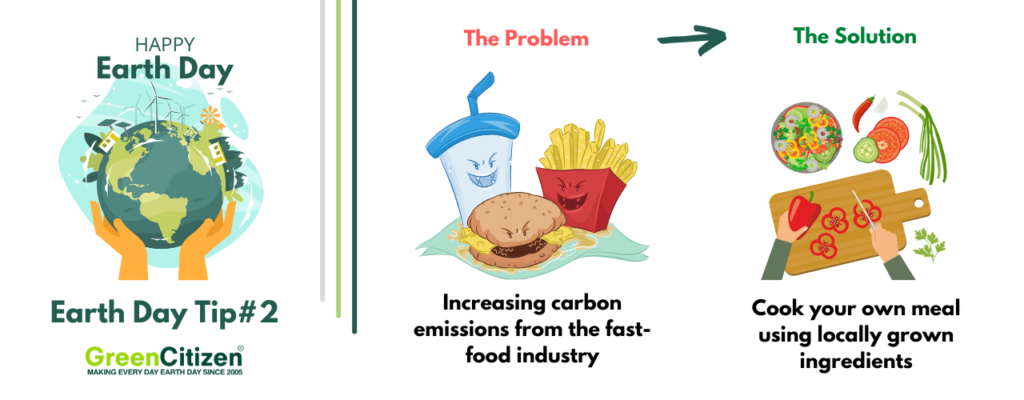
ACTION
Eating local not only supports local farmers and venues, but your food travels less from farm to table. Less “food miles” means fewer carbon emissions.
Vegetables that are organically grown on small family farms are not only free from pesticides but also taste better and have more nutrients.
Celebrate Earth Day by making a feast on which you’ll serve only locally grown food.
3. Take Shorter Showers
PROBLEM
The average person wastes up to 30 gallons of water every day without even realizing it.
SOLUTION
Take shorter showers and fix leaking fixtures in your bathroom.
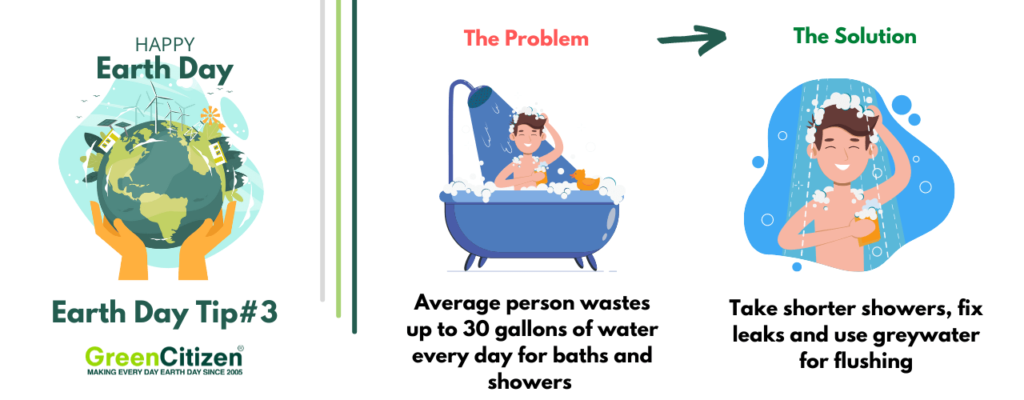
ACTION
Do you think about ways to save planet Earth and revert climate change in the shower?
Please don’t.
If you can get through with scrubbing and rinsing in under 5 minutes, you’ve already done a lot!
Next, use Earth Day to replace worn-out washers in your faucets. Drop by drop, an average American home can leak more than 10,000 gallons of water through inefficient plumbing.
Don’t let the money go down the drain. Call your local plumber or, even better, learn how to fix a running toilet yourself!
You can even try building a DIY composting toilet!
4. Consider Going Meat-Free
PROBLEM
Meat farming leads to greenhouse gas emissions, deforestation, and biodiversity loss.
SOLUTION
Try a meat-free diet by adopting some of the best meat alternatives.
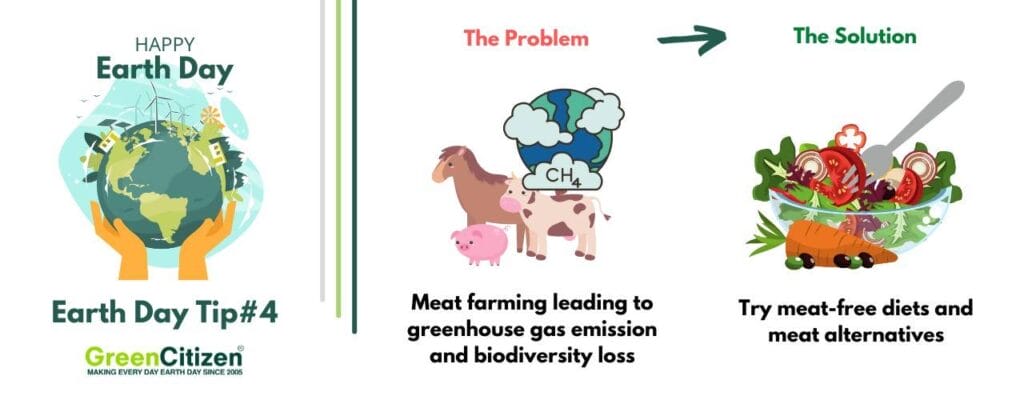
ACTION
The world’s population is expanding rapidly and the meat demand is higher than ever, taking a heavy toll on the planet’s resources. Health claims aside, a vegetarian or vegan diet is far better for our environment than those including meat.
If you can’t resist the taste of ground beef, try some of the non-GMO alternatives like pea-based ground beef, or super tasty Dr. Praegers Veggie Burgers made with lentils, brown, rice, and mushrooms!
5. Choose Online Billing
PROBLEM
About 1 billion trees worth of paper are thrown away every year in the U.S. A large part of these is utility bills, brochures, and catalogs that no one ever reads.
SOLUTION
Opt for online billing and cancel unnecessary subscriptions.
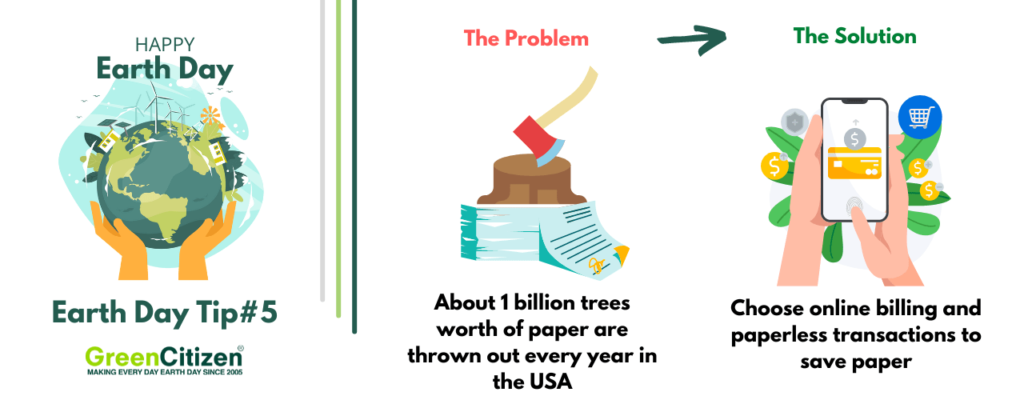
ACTION
Utility providers, cable, companies, and banks let you choose to receive online statements or printed ones. Help our planet recover from trash by choosing online statements. Not all localities have developed recycling networks, so this also reduces the amount of paper that goes to landfills.
If you get a lot of unwanted catalogs and brochures, at least make sure that paper ends up in the recycling bin.
Also, cancel all unnecessary subscriptions. Use the PaperKarma app to automatically unsubscribe from junk mail and unwanted catalogs.
6. Collect Rainwater
PROBLEM
Our planet appears blue from outer space, but we can use only 1% for drinking and cooking.
SOLUTION
Collect rainwater and use it instead of drinking water.
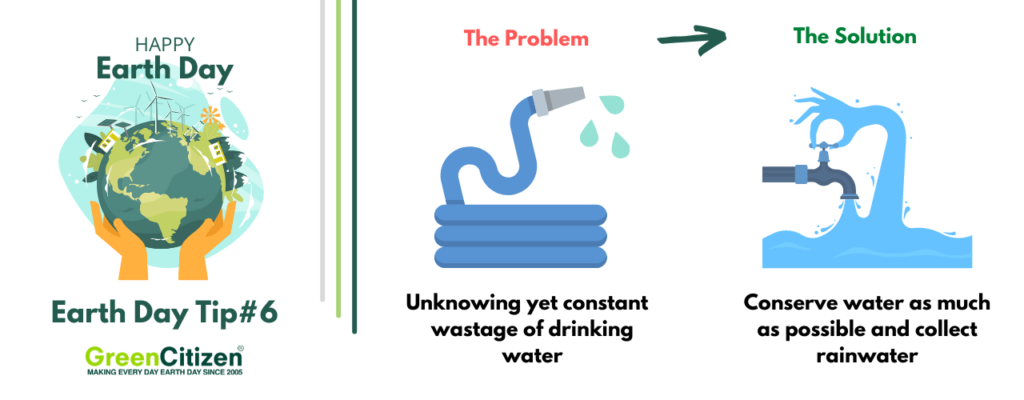
ACTION
Don’t let the rainwater runoff your roof into a storm drain. Rainwater is perfect for outdoor use. Collect the runoff from your roof in a rain barrel and use it to water your garden and lawn when there’s no rain.
Install a debris screen on top of the barrel to filter leaves and other debris from entering and decomposing. It also stops mosquitos from using your rain barrel as a breeding ground.
In addition, you can also collect water from your dishwasher, sink, and washing machine. Many sustainable homes already have dual plumbing that collects so-called “graywater”.
If you’re not up to expensive remodels, just put a plastic bucket in the shower to catch gray water and use it to flush your toilet.
Every little bit helps.
7. Buy Green Products
PROBLEM
Non-recyclable waste is becoming a major issue in every corner of the world. A study shows that during the lockdown packaging waste has increased by 53%. Now is the time to settle the score.
SOLUTION
Keep an eye on what goes into your shopping cart and give priority to sustainable products.
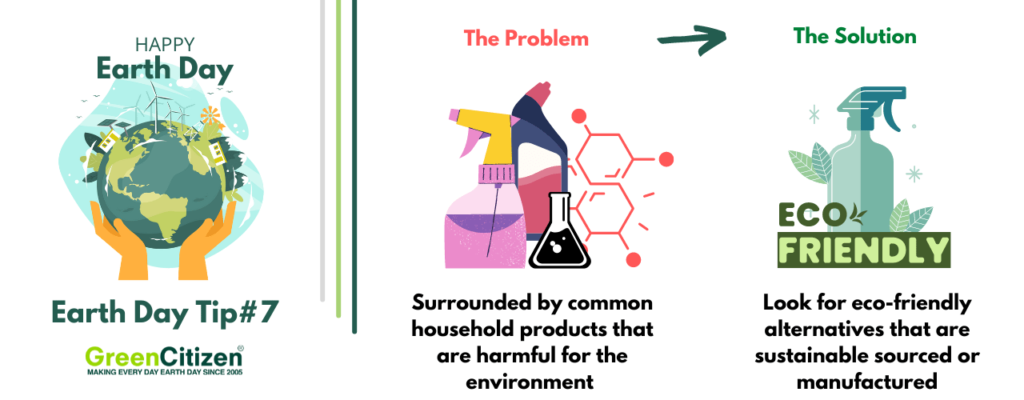
ACTION
Instead of single-use, disposable items, look for eco-friendly products that are reusable, second-hand, sustainably sourced, or made of recycled materials. For example, a bar of sustainable soap in the paper wrap is way better for the environment than a bottled shower gel with microplastic particles.
Cancel paper towels and wet wipes. Instead, buy reusable kitchen towels or make your cleaning rags from old T-shirts or socks.
If you have small children, switch from disposable baby diapers to reusable ones made of cotton — they come with a ton of benefits for both your baby and the environment.
Disposable diapers and wet wipes can’t be recycled, not even on Earth Day.
8. Plant a Garden of Edibles
PROBLEM
Large-scale food production depends on the use of pesticides and industrial fertilizers, while excessive tillage leads to soil erosion and loss of nutrients.
SOLUTION
Become independent of commercial food chains by growing your food.
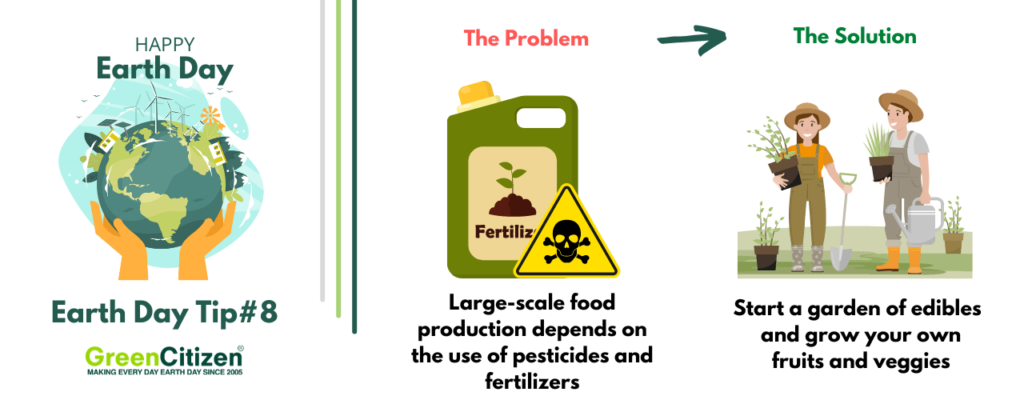
ACTION
Use Earth Day to teach your kids gardening by starting a small patch in your backyard. Include native varieties that attract pollinators and you’ll have plenty of fresh veggies all summer long.
If you don’t know where to start, take a look at how this inspiring woman from Australia has set up a permaculture garden in her suburban backyard.
Home gardening goes hand in hand with composting, which solves another big environmental problem — food waste. Food waste and tree clippings in community landfills generate methane and other gases that affect climate change.
Setting up a composting operation is not difficult at all, especially if you have a step-by-step guide.
You can safely compost all food scraps including paper, except meat.
9. Reduce Your Carbon Footprint
PROBLEM
The average person in the U.S. leaves a carbon footprint of 16 tons a year. It’s high time to bring down this unflattering record.
SOLUTION
Adopt more sustainable lifestyle practices and make low-emission adjustments to your home.
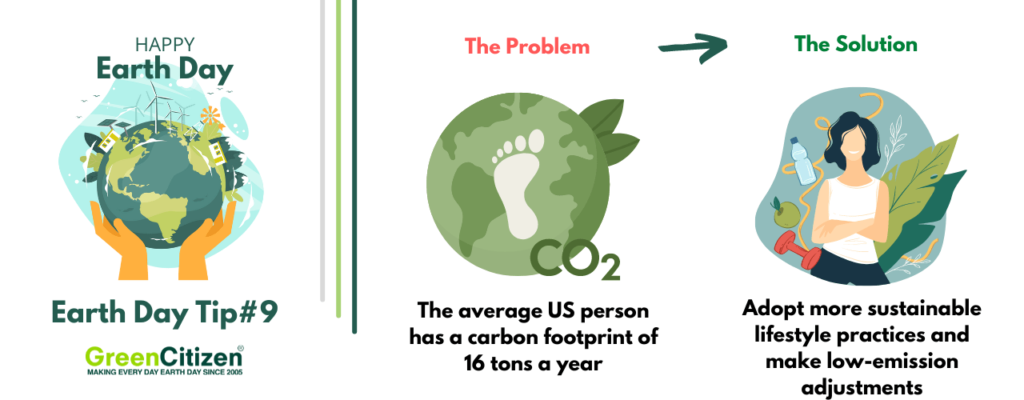
ACTION
Curb greenhouse gas emissions by riding your bicycle to work more often, ridesharing, or using public transport whenever you can. Not only does this cut CO2 emissions in your community on Earth Day also but it also supports public transport development.
Turn off household electronics when no one’s using them. But listen to this — modern devices consume a small amount of power even when turned off. It’s the energy that has no use and still, you’re paying for it.
Use power strips to effectively unplug the devices overnight. It’s not much but adds up over the months.
The bulk of our power plants still depend on fossil fuels, so there’s every reason not to waste electricity.
10. Recycle Electronics
PROBLEM
Electronic waste poses a significant environmental hazard, and still there’s no U.S. federal law that requires the recycling of e-waste or prohibits it from being exported to developing countries.
SOLUTION
Nip the problem in the bud — find the nearest electronics recycler.
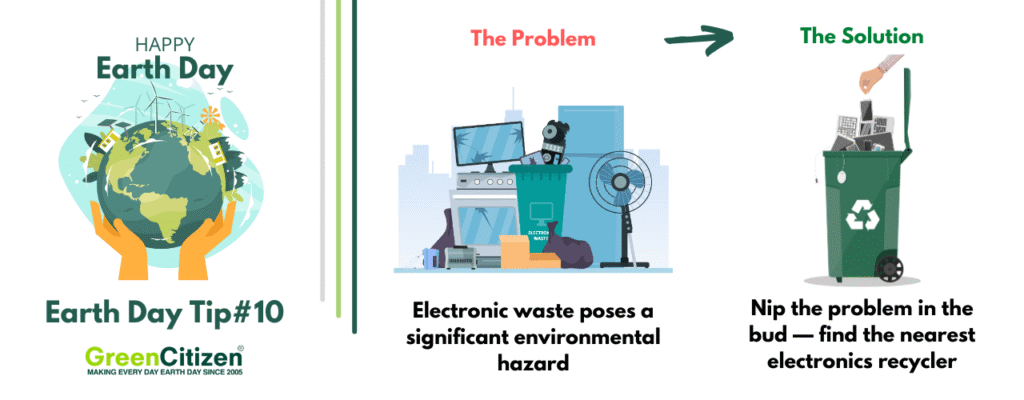
ACTION
Old cell phones, batteries, broken gadgets — don’t let them sit around. Take them to the nearest electronics recycling depot before someone throws them out with the trash. This way you prevent plastics and heavy metals from polluting soil and water.
But before you recycle, try to fix whatever you can.
Even if you’re not a born handyman, there’s no reason to trash something that stopped working. YouTube tutorials and apps like TaskRabbit can show you how to fix different household products.
11. Use LED Bulbs
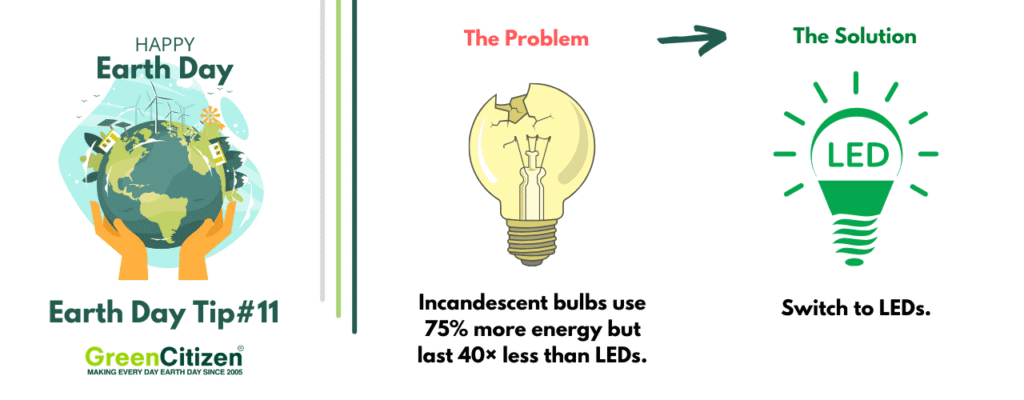
PROBLEM
Traditional incandescent bulbs use 75% more energy but last 40 times less than new LED bulbs. This means not only more emissions but also more waste.
SOLUTION
Switch to LEDs.
ACTION
Replace all incandescent light bulbs in your home with new LED bulbs. You’ll not only save energy but also forget when was the time you had to replace a bulb. Traditional incandescent light bulbs are already banned in some parts of the world.
Don’t throw the old-style bulbs away.
Use them to make these miniature eternal terrariums — a perfect Earth Day craft!
12. Stop Wasting Heat
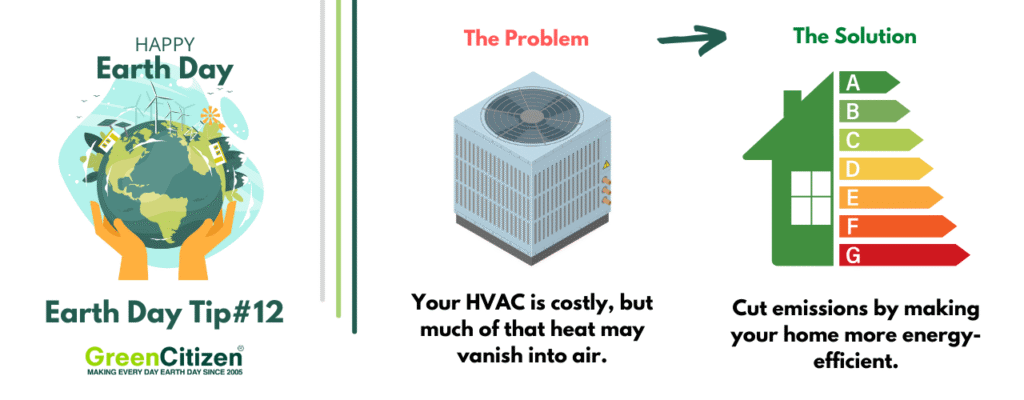
PROBLEM
It doesn’t matter where you live — energy use by your HVAC is likely the most expensive item on your tab. But what if part of that heat literally goes into thin air?
SOLUTION
Reduce your home’s emissions by making it more energy-efficient.
ACTION
A programmable thermostat can regulate your home’s temperature even when you forget to turn off the AC or heating. Lower the temperature at bedtime and when there’s no one at home.
Even small changes like this help our planet a lot.
Reducing your home’s carbon footprint even more with a few ceiling fans. Fans help circulate the air more effectively so your AC unit doesn’t have to work that hard.
Finally, consider using eco-friendly insulation in your home. Products based on hemp wool and sheep’s wool are considered the greenest home insulation options – hypoallergenic, non-toxic, and eco-friendly.
13. Plant Trees
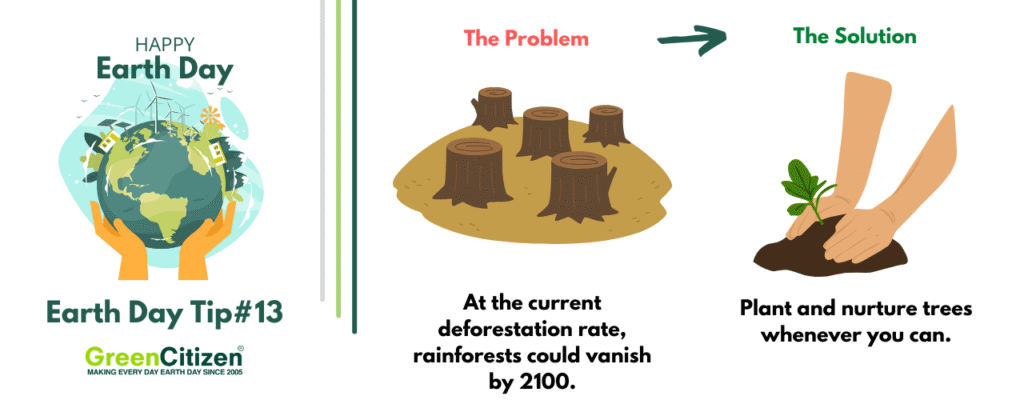
PROBLEM
At the current deforestation rate, the world’s rainforests could completely disappear by 2100. Forests trap carbon dioxide and prevent soil erosion, but are also home to the most diverse ecosystems.
SOLUTION
Every one of us should use every opportunity to plant and nurture a tree.
ACTION
This one is pretty simple — plant a tree.
The best thing about planting a tree is that you don’t have to wait for Earth Day — you have 364 perfectly good days to buy a sapling, dig a hole, and prepare some mulch.
Want to grow a backyard forest?
Check out what this guy has done to trap carbon dioxide.
Plant a couple of leafy trees on the south and west side of your home to shield your house from the scorching summer heat. In a few years, you won’t have to run the AC nearly as much. In winter, the tree will shed its leaves, allowing plenty of sunshine and natural heat.
14. Teach Your About Kids Recycling
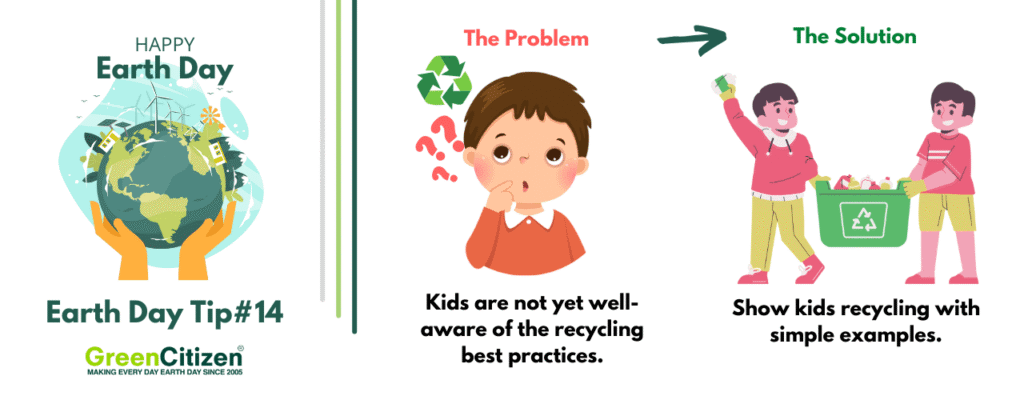
PROBLEM
Kids are not familiar with recycling practices and sustainability from a young age.
SOLUTION
Get your kids involved in recycling by teaching examples.
ACTION
Make recycling a family habit.
Set up a family recycling corner in the backyard and show your kids the first steps in recycling.
Let them draw recycling symbols for the bins for plastic, paper, and glass. If you already have a compost pile going, they’ll love this, too.
Celebrate this year’s Earth Day by throwing a little exhibition of things you and your kids made from junk. Show them different ways to make a birdhouse from a milk carton or whirligigs from plastic bottles.
Who says Earth Day tips can’t be both fun and educational?
15. Volunteer for Clean Up
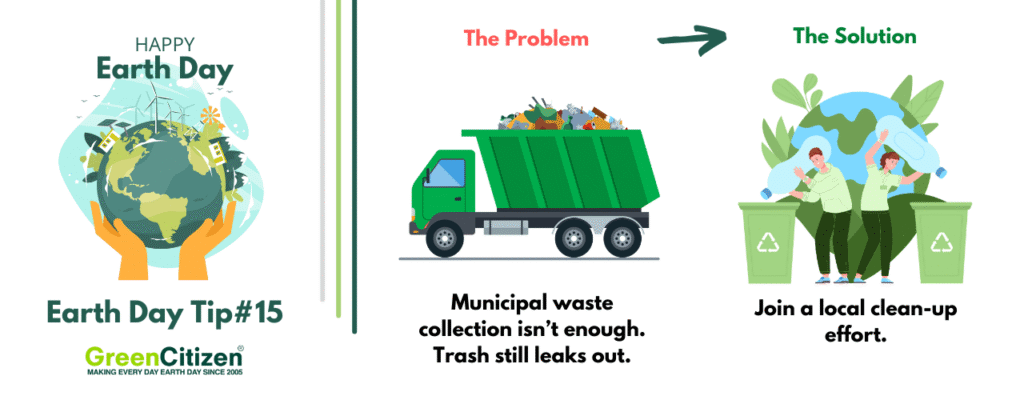
PROBLEM
Municipal waste collection doesn’t seem to be enough. Trash still finds its way to our rivers and oceans.
SOLUTION
Join a clean-up action in your community.
ACTION
On Earth Day, community groups often organize clean-up actions in parks, beaches, or alongside the roads. All you need is a trash bag, pair of work gloves, pokey stick, or a grabber and you’re good to go.
If you’re prevented from taking part in the cleanup, you can still help by spreading the good word. People need to know why sustainability and climate action are important and how to do their part.
Share inspiring green news on social media, so people can understand why we should make every day Earth Day.
16. Get a Green Job
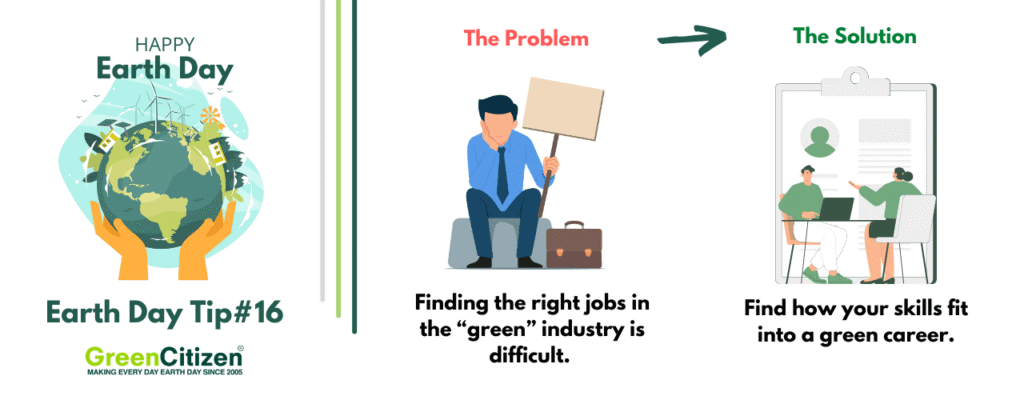
PROBLEM
You’re looking for a job in a growing industry that can make a positive difference in the world.
SOLUTION
See how you can use your qualifications to launch promising green careers.
ACTION
Looking for a new job? Did you know that sustainability and renewable energy are among the fastest-growing industries in the country?
A report by the International Labor Organization (ILO) shows that the current trends of decarbonization and circular economy may create 18 million green jobs worldwide.
Don’t wait for Earth Day. Whether you hold a degree in Energy, Agriculture, Design, Transport, or Tourism, check out the best green employers in your area.
17. Go Easy on the Pedal
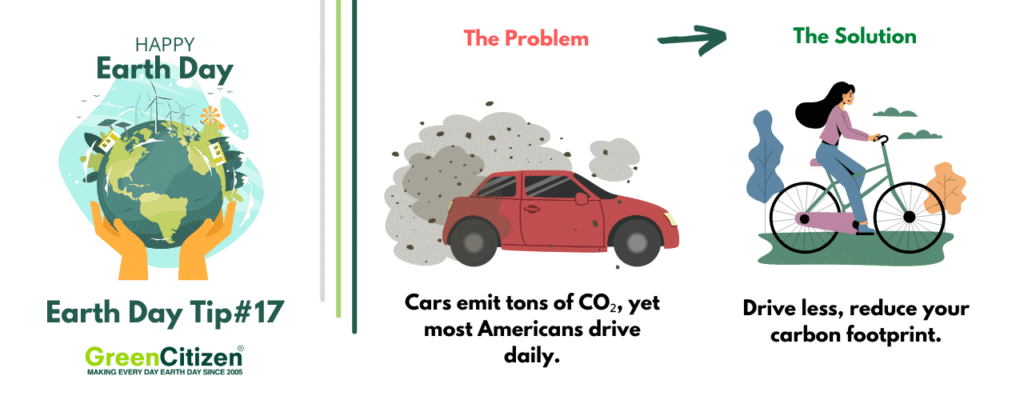
PROBLEM
A typical passenger vehicle emits about 4.6 metric tons of carbon dioxide per year. Yet 76 percent of Americans drive to work every day.
SOLUTION
Adopt more sustainable driving habits.
ACTION
There are ways you can help the planet with your car. A full-electric car might be out of your range, but going easy on the gas pedal helps the environment too.
Speeding and unnecessary acceleration reduce mileage by 33 percent, not to mention the air pollution caused by tire particles as a result of excessive braking.
If possible, establish a carpooling system with your coworkers. It gets easier if those 4.6 metric tons are shared among four people.
18. Shop Clothes Responsibly
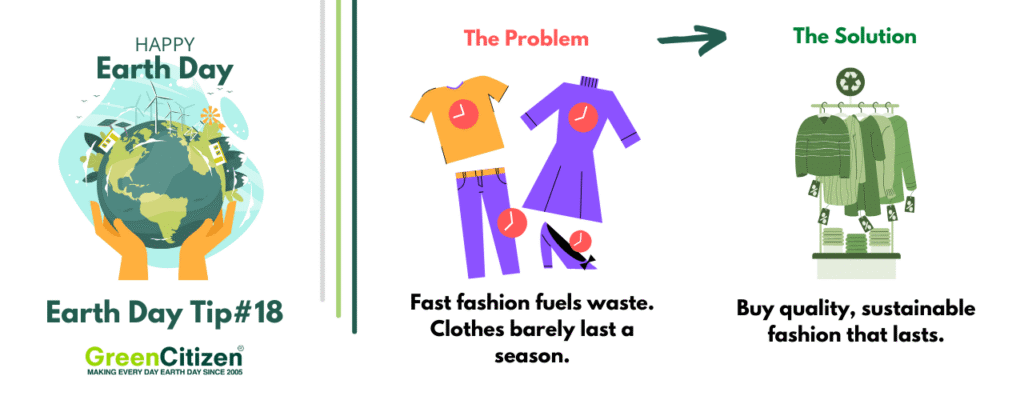
PROBLEM
Fast fashion retailers are trying to mimic high-end luxury brands at competitive prices and maximum profits. As a result, we quickly end up with piles of clothing that barely lasts through one season.
SOLUTION
Invest in all-time quality pieces made of organic and sustainable materials.
ACTION
Choose quality items from thrift stores and look for outfitters like Patagonia that have something called a “buy-back” policy for worn items.
Clothes made from organic cotton, hemp, wood pulp, or pineapple fibers are a bit more expensive than polyester, but last longer and are much more pleasant to wear.
Celebrate Earth Day by wearing Earth-friendly clothing.
19. Seek out Sustainable Services
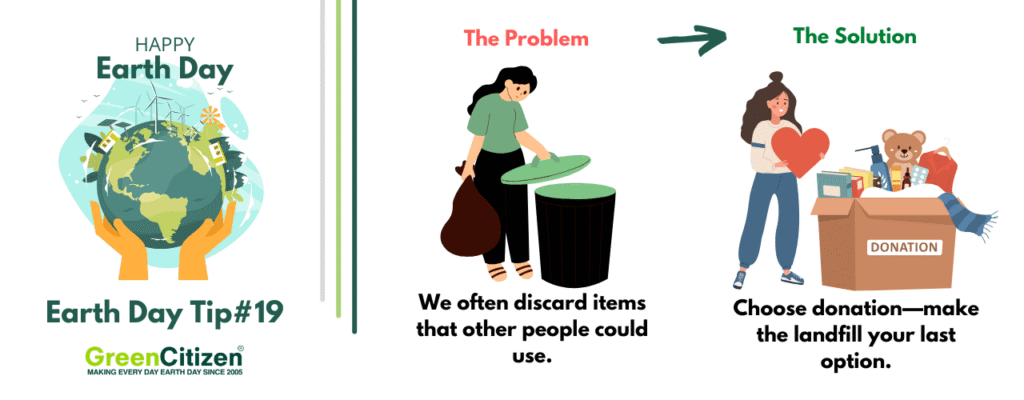
PROBLEM
We often discard items that other people could use.
SOLUTION
Let the dumpster become the last resort for unwanted things.
ACTION
Some people make a living by recycling, restoring, and repurposing items we often throw away.
With all the sales websites, selling or donating things we no longer need has never been easier. Just snap a couple of photos and you’re ready to go. Mail it and drop it off, without having to deal with anybody.
On the other hand, if you’re more comfortable dealing face-to-face, google your local charities or stores that will accept old furniture or appliances.
Whether it’s batteries, glass, or hazardous waste, get into the habit of looking for the nearest drop-off location.
20. Go Outside
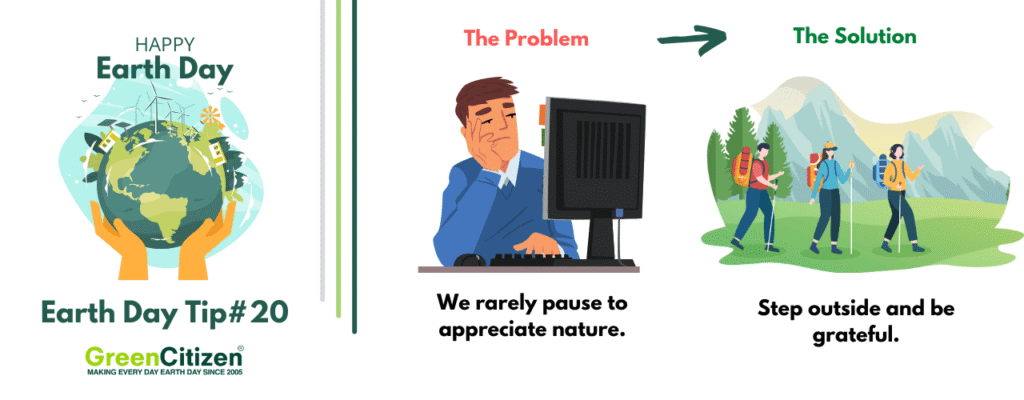
PROBLEM
We often have little time to appreciate the world around us.
SOLUTION
Step outside and feel thankful.
ACTION
And finally what better way to celebrate Earth Day than by being outside. Do some yard work, go for a walk, join one of the cleanup actions, or take part in a local Earth Day celebration.
Reflect on the beautiful world around you and think about how you can help to keep it that way.
Final Thoughts
In 1970, U.S. Senator Gaylord Nelson came up with the idea of a nationwide environmental teach-in, what is to become Earth Day.
35 years later, on April 22, 2005, GreenCitizen was founded to reverse the environmental damage done to the Earth by developing a sustainable metropolitan circular economy.
Since the first Earth Day marches and rallies, people have been celebrating Earth Day as a reminder of the importance of saving the Earth, fighting climate change, and finding new ways to adopt a sustainable lifestyle.
Now it’s our turn to teach our children to be green citizens and make every day Earth Day, one green activity at a time.

